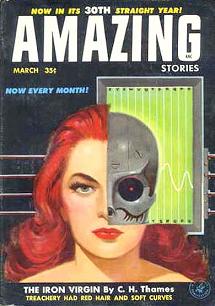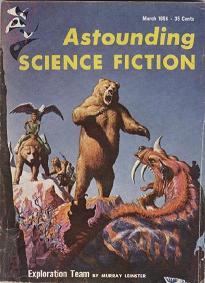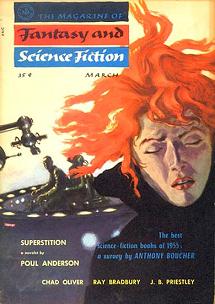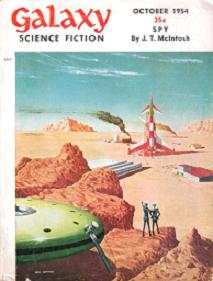
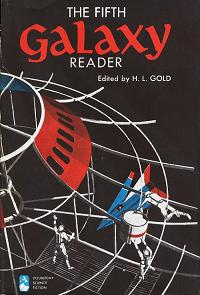 X Minus One aired Jack McKenty’s short story “$1,000 a Plate” on March 21, 1956. It originally appeared in the October 1954 issue of Galaxy. I’d never heard of McKenty, but a quick search of the ISFDB reveals that he sold only two stories, this one, and “Wait for Weight,” a short story appearing in the October 1952 issue of Galaxy. Editor Horace Gold liked “$1,000 a Plate” enough to include it in The Fifth Galaxy Reader (Doubleday, March1961).
X Minus One aired Jack McKenty’s short story “$1,000 a Plate” on March 21, 1956. It originally appeared in the October 1954 issue of Galaxy. I’d never heard of McKenty, but a quick search of the ISFDB reveals that he sold only two stories, this one, and “Wait for Weight,” a short story appearing in the October 1952 issue of Galaxy. Editor Horace Gold liked “$1,000 a Plate” enough to include it in The Fifth Galaxy Reader (Doubleday, March1961).
“$1,000 a Plate” takes place on Mars’ moon Deimos, at a time when it has been highly commercialized and visitor friendly. The enterpreneurial casino business has arrived to entice the tourist trade to part with their dollars, while research and exploration is taking place via astronomers and their telescopes searching the heavens in Deimos’ crystal clear atmosphere. But there’s a problem. The casinos celebrate with fireworks exploding colorfully all over the sky, which pollutes the pristine atmosphere and fogs the astronomers’ telescopes. Bringing their problem to the casino owner proves fruitless, so the astronomers hatch an ingenious plan to win the day and once again clear the skies for their important explorations. And it is quite a creative plan indeed, which actually ends up with both sides winning. But how? Listen to find out how a scientific solution creates a win-win situation and you’ll understand why Galaxy editor Horace Gold felt compelled to give space to this short story in The Fifth Galaxy Reader.
Aside from the fact that horror legend Bela Lugosi died in 1956, it was a pretty good year for SF. The first Milford (PA) Science Fiction Writers Conference was held by its organizers Damon Knight, James Blish, and Judith Merril. Several noteworthy novels from 1956 included Philip K. Dick’s The Man Who Japed, Lester del Rey’s (expanded from the original novella) Nerves, Jack Vance’s To Live Forever, Star Ways by Poul Anderson, and Richard Matheson’s The Shrinking Man (from which Hollywood would retitle its film of the novel The Incredible Shrinking Man). The Hugo for Best Novel went to Robert A. Heinlein’s Double Star, awarded at Newyorcon, the 14th World Science Fiction Convention in New York.
Play Time: 28:47

{After curling up in front of the radio on a cold March evening in 1956 to listen to X Minus One, further adventures could be had by reading SF/F/H magazines waiting to share their visions with eager minds, a few examples of which are showcased below. Junior had trouble finding his copy of the Amazing though, until dad fessed up that he had “borrowed” it. Small wonder, with the cover story teaser at the bottom reading “Treachery Had Red Hair and Soft Curves.”}
{Left: Amazing, March 1956 – Center: Astounding, March 1956 – Right: F&SF, March 1956}
